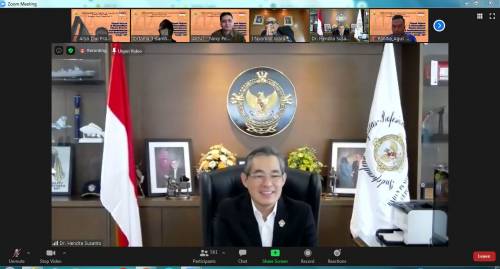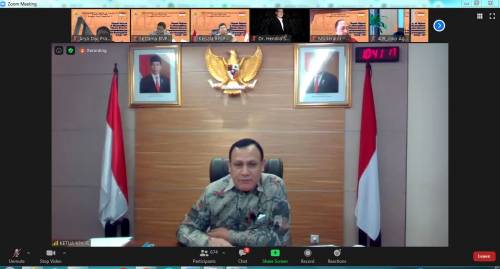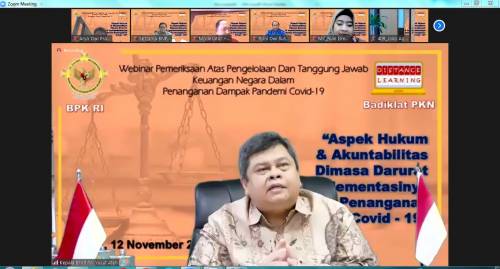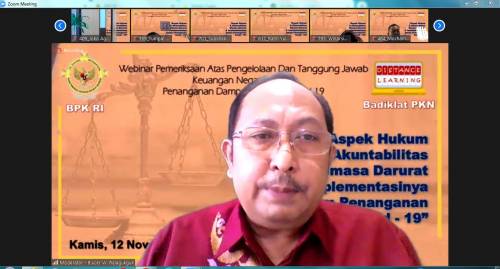BPK Holds A Webinar On Covid-19 Response Audit
JAKARTA, BPK Public Relations – BPK Board Member I Hendra Susanto opened and gave a keynote speech at a webinar on Covid-19 response audit organized by the BPK Training Institute of State Finance Audit. Presenting the theme of Legal Aspects and Accountability in Emergency Period and Its Implementation in Handling Covid-19, the webinar held on Thursday aimed at gaining an understanding on government strategies and policies and their implementation from legal aspects and accountability points of view.

The webinar resources persons included Chairman of the Corruption Eradication Commission (KPK) Firli Bahuri, Head of the Financial and Development Comptroller (BPKP) Muhammad Yusuf Ateh, Head of the Government Procurement Policy Agency (LKPP) Roni Dwi Susanto, and Secretary of the National Disaster Management Agency (BNPB) Harmensyah. Moderated by BPK Director General of Legal Affairs Blucer Welington Rajagukguk, the webinar was also attended by BPK officials and auditors of more than 650 people in total.
In his presentation, BPK Board Member I said that to ensure transparency and accountability in handling Covid-19, the BPK conducted a comprehensive audit starting with workshops and webinars, forming audit working groups, collecting data and information, and conducting preliminary audit.

"The State Financial Audit Standard states that an auditor needs to obtain a good understanding on his audited entity in order to identify problems, determine materiality, risks, and types and sources of evidences. In addition, he also needs to have sufficient expertise, especially in this condition of the pandemic when normal audit procedures cannot be fully implemented," he said.
Based on the results of the initial assessment, the BPK has identified four risks in handling the Covid-19 pandemic, namely:
- Strategic risk: the risk of not achieving policy objectives;
- Compliance risk: the risk of violating regulations that can result in legal risks;
- The risk of moral hazards and fraud: the abuse of authority and fraud in implementing policies that can result in the state loss;
- Operational risk: the risk related to constraints found due to complexity of activities, wide ranges of control, central and regional coordination, data validity, and the number of new regulations that needs to be soon implemented.

These risks have to be mitigated with a good internal control and a supervision from internal and external parties to ensure transparency, accountability, and effectiveness of policies taken to handle the pandemic.
"To respond the risks that may occur in handling Covid-19, the BPK carries out the role of oversight, the roles of insight and foresight, to the government, the parliament, and the public. BPK mitigates risks, identifies criteria and alternative procedures for the audit, monitors policies and their implementation, and monitors the source and realization of funds for handling Covid-19," Board Member said.
He further added that the BPK asked its auditors to take into account the emergency period the government had been facing when handling the pandemic, so that they could provide clearer and fairer assessment when evaluating the implementation of policies. With insight and foresight approaches, the BPK would also provide its thoughts, opinions, and recommendations that the handling of Covid-19 would be implemented better.

"This webinar is expected to give an adequate framework for auditors to plan and carry out the audit, so that the assessment of activities and expenditures, the identification of problems and their causes, and the formulation of recommendations or opinions can support the government efforts in handling the pandemic," he concluded.
